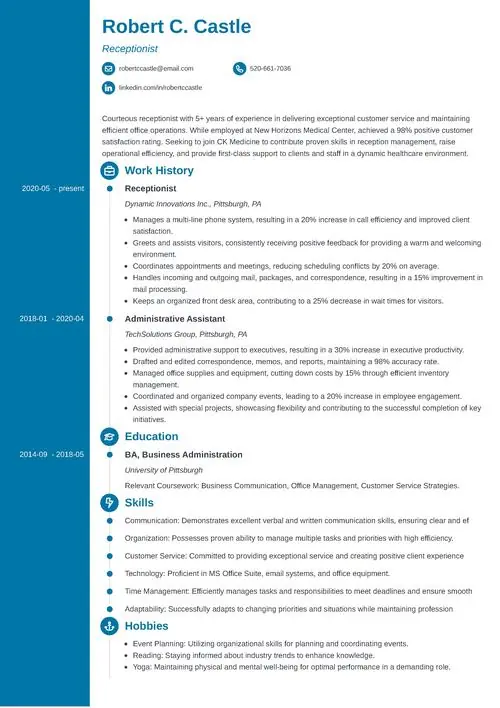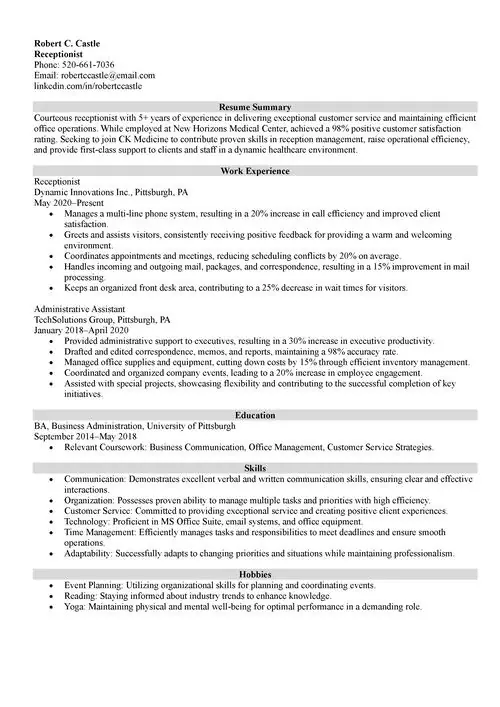In the bustling world of corporate dynamics, a receptionist serves as the frontline ambassador, possessing unique skills beyond answering phones and managing appointments.
Mastering receptionist skills will help you thrive during the recruitment process and further in your role. In this article, we’ll guide you through essential skills for a receptionist position, providing pro tips to refine your abilities and set up for stellar success.
This guide will show you:
- How to add receptionist skills to a resume to impress employers.
- 10+ examples of skills for a receptionist you can include in your application.
- Ideas on improving your receptionist skills and further elevating your career.
Want to save time and have your resume ready in 5 minutes? Try our resume builder. It’s fast and easy to use. Plus, you’ll get ready-made content to add with one click. See 20+ resume templates and create your resume here.
Sample resume made with our builder—See more resume examples here.
One of our users, Brittanya, had this to say:
Zety really helped me create the best resume possible. It pointed out how things could be better on my existing resume and suggested many things to be re-worded or removed.
Writing a receptionist resume or applying for an administrative job? These dedicated guides might be of help:
- Administrative Assistant Resume
- Front Desk Receptionist Resume
- Medical Receptionist Resume
- Office Administrator Resume
- Secretary Resume
What Are Receptionist Skills?
Receptionist skills combine hard and soft competencies that help perform duties related to this role effectively. They include a mix of personal skills such as communication and time management, as well as basic computer knowledge and common office administration skills.
Whether it’s an office job or one within hospitality, a receptionist's role exceeds typical admin duties. A candidate for this profession must possess a blend of interpersonal skills, organizational prowess, and excellent adaptability.
10 Top Receptionist Skills Examples
From seamless multitasking to empathetic guest interactions, each receptionist’s skill contributes to their excellence, fostering impeccable service and ensuring positive visitors’ impressions.
Below, you can find the list of the top 10 receptionist skills that help them thrive in their roles:
1. Multitasking
Receptionists are the backbone of any office and are responsible for an organized and efficient work environment. The ability to juggle multiple tasks is their key proficiency. Such professionals possess distributive attention; they can handle phone calls, greet guests, and address inquiries while staying focused and graceful. Here are a few examples of when they must prove their multitasking skills:
- Managing phone calls while welcoming and assisting guests at the front desk.
- Simultaneously coordinating appointments and managing administrative tasks.
- Handling unexpected situations, such as resolving conflicts or managing urgent requests.
2. Communication
Effective communication is fundamental for a receptionist to convey information clearly and empathetically. Communication prowess encompasses active listening, clear articulation, and the capacity to adapt communication styles to diverse individuals and scenarios. Whether dealing with guests, colleagues, or management, clear communication fosters an environment of understanding. Such skills are inevitable, especially in these situations:
- Engaging with guests while providing them with relevant information.
- Collaborating with colleagues to convey important messages and facilitate regular operations.
- Effectively communicating with management regarding guest feedback, operational issues, and scheduling concerns.
Read more about communication skills complemented with a wider list of examples of such skills.
3. Technical Proficiency
Receptionists must be adept at using diverse software and communication tools. Employers expect them to be familiar with reservation systems, proficient in the Microsoft Office toolkit, and able to resolve simple technical issues. Here are instances where applying computer skills is unavoidable to meet the demands of a receptionist's duties:
- Managing online booking platforms and updating guest information.
- Using email, word processing, and spreadsheet software for administrative tasks.
- Troubleshooting minor technical issues with office equipment and communication devices.
Seeking a more extensive explanation of technical skills? Check this comprehensive technical skills guide.
4. Organization
Strong organizational abilities empower receptionists to maintain structured and efficient operations within the reception area. Such professional skills involve time management ability, meticulous record-keeping, and the capacity to prioritize tasks in a dynamic work environment. See the exemplary situations when a receptionist must demonstrate these abilities:
- Scheduling appointments and managing a calendar of events accurately.
- Organizing paperwork, documents, and guest records for easy accessibility.
- Prioritizing tasks based on urgency and importance to ensure smooth workflow.
5. Customer Service
Customer service skills encompass empathizing with guests, anticipating their needs, and providing personalized assistance. Such abilities help to create an atmosphere of hospitality where guests feel valued and understood. Here are specific scenarios where customer service skills are imperative for successfully executing a receptionist's duties and tasks:
- Addressing guest concerns and resolving issues with patience and understanding.
- Anticipating guest needs and proactively offering assistance or additional information.
- Demonstrating empathy when interacting with guests from diverse backgrounds and with varying needs.
Read more about the top 20 customer service skills you must possess to thrive in a customer-oriented role.
6. Professional Etiquette
Receptionists are known for values and qualities such as poise, diplomacy, and professionalism. Professionalism involves maintaining a polished appearance, adhering to company standards, and upholding decorum in situations requiring such aptitude. Here are some cases where professionalism plays a key role:
- Greeting guests and creating a positive first impression.
- Adhering to established dress codes and grooming standards.
- Handling challenging interactions requiring tact and diplomacy.
7. Adaptability
Flexibility helps receptionists navigate dynamic and unpredictable work scenarios easily. This skill involves embracing change, adjusting to evolving priorities, and seamlessly transitioning between different responsibilities. A receptionist needs these skills in various situations, such as:
- Adapting to changes, such as last-minute appointments or sudden cancellations.
- Accommodating urgent guest requests or resolving unforeseen issues.
- Transitioning between different tasks and responsibilities with agility and composure.
8. Cultural Versatility
Receptionists often work in multicultural environments. Unsurprisingly, they’re expected to recognize and respect cultural differences among guests and colleagues. Such skills foster inclusivity and contribute to creating a safe space for everyone. Here are the tasks of a receptionist that demand these skills in particular:
- Respecting cultural norms and customs when interacting with guests from different cultural backgrounds.
- Using inclusive language and gestures to create a welcoming atmosphere for all guests.
- Adapting communication styles to align with the cultural preferences of diverse guests.
9. Attention to Detail
Attention to detail is a crucial skill that enables receptionists to maintain accuracy and precision in their tasks, ensuring no detail goes unnoticed. This skill involves thoroughness in administrative work, meticulous documentation, and a keen eye for spotting and rectifying errors. Here are the examples of when a receptionist needs such abilities:
- Maintaining guest records and ensuring all information is up-to-date.
- Proofreading written correspondence, such as emails and guest communications, to ensure accuracy.
- Noticing and rectifying any discrepancies in scheduling or guest information.
10. Problem-Solving
Problem-solving abilities complement a list of skills for a receptionist. Basically, they allow receptionists to address challenges and resolve issues that may arise during their duties. Such skills incorporate critical thinking, resourcefulness, and the ability to devise practical solutions to various problems. Below, you can see exemplary duties where problem-solving skills are pivotal:
- Addressing and resolving guest complaints or concerns promptly.
- Finding alternative solutions in case of conflicts or unexpected changes.
- Collaborating with colleagues to solve technical issues and accelerate operations.
Check more on problem-solving skills and attitudes that recruiters highly value.
Creating a resume with our builder is incredibly simple. Follow our step-by-step guide and use content from Certified Professional Resume Writers to have a resume ready in minutes.
When you’re done, Zety’s resume builder will score your resume and our resume checker will tell you exactly how to make it better.
How to Showcase Receptionist Skills on a Resume?
Highlighting receptionist skills on a resume helps to demonstrate your proficiency and expertise in delivering exceptional guest experiences. Strategically including these skills within particular resume sections not only underscores your qualifications but also captures a recruiter's attention.
Here’s where to mention receptionist skills on a resume for maximum impact:
1. Mention Them in a Resume Summary or Objective
Incorporate skills for a receptionist in the resume summary or resume objective by succinctly underlining key competencies that align with the job requirements. Use this section to convey your passion for delivering impeccable customer service, proficiency in multitasking, and any other attributes that set you apart as a receptionist candidate.
Pro Tip: Tailor your resume summary to emphasize how your receptionist skills have directly contributed to improved guest satisfaction levels or operational efficiency in previous roles.
2. Create a Separate Skills Section
The easiest way to showcase your receptionist skills is to list them within the skills section. Remember to include your technical proficiencies, interpersonal strengths, and organizational abilities. Ensure that the key skills you decide to list directly correlate with the specific requirements outlined in the job description for maximum relevance.
List up to 10 skills indicating your strongest points as a receptionist. To choose the most relevant ones, view a more extensive list of receptionist skills below:
Additional skills for a receptionist:
- Conflict resolution
- Event coordination
- Inventory management
- Cash handling
- Telephone etiquette
- Guest check-in/check-out
- First aid/CPR certification
- Language proficiency (e.g., bilingual)
- Social media management
- Vendor coordination
- Data entry
- Basic accounting knowledge
- Office equipment maintenance
- Appointment scheduling
- Presentation skills
- Filing and record-keeping
- Dining reservations
- Sales support
Pro Tip: Prioritize your receptionist skills based on their significance to the role, placing the essential skills at the beginning of the list to capture immediate attention.
3. Add Receptionist Skills to Work Experience Descriptions
Integrate your receptionist skills within the descriptions of your previous work experiences. Use concise, impactful language to demonstrate how you leveraged your skills to handle daily duties, manage guest interactions, and contribute to the overall success of your workplace.
Pro Tip: Quantify your achievements wherever possible, such as mentioning the volume of calls managed per day or the percentage increase in positive guest feedback due to your exceptional customer service.
4. Highlight Related Accomplishments
If you have any outstanding accomplishments on your record, highlight them in a separate section. Mention any awards, commendations, or instances of going above and beyond in your receptionist role.
Pro Tip: Use action-oriented language to illustrate how your receptionist skills impacted the guest experience or operational effectiveness, demonstrating your value as a receptionist professional.
5. Feature Them in the Education Section
While the education section typically focuses on academic qualifications, consider incorporating any relevant training, licenses and certifications, or workshops that have honed your receptionist skills. Refer to courses in customer service, communication, or software proficiency.
Pro Tip: When detailing additional training or certifications, emphasize how they have enhanced your receptionist skill set and contributed to your professional development.
How to Master Your Receptionist Skills?
Elevating your receptionist skills can be a strategic move, both personally and professionally. Above all, it can position you as a highly proficient and adaptable professional in customer service.
In today's competitive job market, honing your receptionist skills is more than necessary—it's your pathway to excellence. Embracing opportunities for skill enhancement enriches your capabilities and strengthens your ability to provide exceptional service and confidently navigate dynamic work environments.
Here’s how you can grow your receptionist skills:
Continuous Development
Engage in continuous development by attending workshops and seminars dedicated to receptionists. Look for specialized programs focusing on customer service excellence, effective communication strategies, and conflict resolution techniques. Platforms like Coursera offer courses like “Customer Service Mastery,” providing practical insights and strategies to improve your receptionist abilities through self-paced learning.
Customer Service Training
Participate in specialized customer service training programs to develop your interpersonal skills. Look for training sessions covering dealing with difficult customers, empathetic listening, and service recovery techniques. For instance, the “Customer Service and Retention” course offered by Udemy provides comprehensive training on managing customer interactions, equipping you with highly usable skills for your role.
Cross-Training Opportunities
Seek cross-training opportunities within your organization to gain exposure to different departments and functions. Shadowing colleagues in concierge services, event coordination, or administrative support can broaden your skill set and provide a more holistic understanding of guest-facing operations. This exposure enriches your skill range and cultivates adaptability and versatility.
Industry Networking
Connect with fellow receptionists and industry professionals through networking events, forums, or mentorship programs to gain invaluable insights and advice for skill improvement. Joining a professional association like the International Association of Administrative Professionals (IAAP) can provide access to mentorship opportunities, educational resources, and networking events. This way, you can further grow your expertise, especially if you seek specific knowledge (like, for example, medical receptionists).
Technology Proficiency
Enhance your proficiency with technology tools relevant to receptionist responsibilities. Master customer relationship management (CRM) software, scheduling and booking systems, and telecommunication platforms. Familiarizing yourself with these tools can streamline operations and boost your efficiency in managing guest interactions and administrative tasks.
Communication Workshops
Participate in language and communication workshops to improve verbal and written communication skills. Search especially for professional writing, public speaking, or business communication courses. Platforms such as edX offer courses like “Business Communication” and “Professional Writing,” which can help you elevate your communication skills.
Incorporating these additional strategies into your professional development plan can further strengthen your receptionist skills and enhance your overall performance as a receptionist. Good luck!
Plus, a great cover letter that matches your resume will give you an advantage over other candidates. You can write it in our cover letter builder here. Here's what it may look like:
See more cover letter templates and start writing.
About Zety’s Editorial Process
This article has been reviewed by our editorial team to make sure it follows Zety's editorial guidelines. We’re committed to sharing our expertise and giving you trustworthy career advice tailored to your needs. High-quality content is what brings over 40 million readers to our site every year. But we don't stop there. Our team conducts original research to understand the job market better, and we pride ourselves on being quoted by top universities and prime media outlets from around the world.





